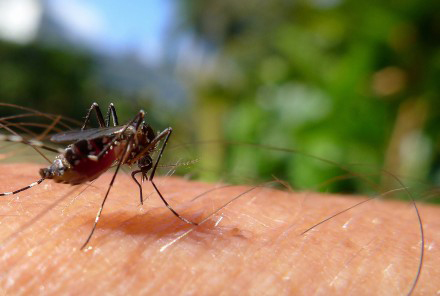New drug puts malaria under the pump

Researchers have discovered how a new class of antimalarial drugs kills the malaria parasite, showing that the drugs block a pump at the parasite surface, causing it to fill with salt.
In work conducted at the Research School of Biology (RSB) at The Australian National University (ANU), and published in the latest edition of Cell Host & Microbe, Dr Natalie Spillman showed that the malaria parasite has at its surface a protein that serves as a molecular salt pump, pushing sodium ions out of the parasite.
“It was within a week or two of our identification of the pump protein that a paper came out reporting the discovery of the spiroindolone antimalarials,” Dr Spillman said.
“The authors of the spiroindolone study identified the pump protein as being of particular interest from the point of view of how the spiroindolones might work, but the exact mechanism was a mystery.
Linking up with members of the spiroindolone-development team in Singapore (Novartis Institutes for Tropical Diseases) and the US (Genomics Institute of the Novartis Research Foundation), Dr Spillman showed that spiroindolones block the parasite’s salt pump, causing the cell to fill rapidly with salt.
“We believe the spiroindolones kill the parasite by causing a salt overload,” Dr Spillman said.
Professor Kiaran Kirk, the senior author on the study, says this vulnerability in the parasite’s physiology can be exploited to develop much needed new antimalarial drugs.
“The malaria parasite’s salt pump would seem to be an Achilles heel for the parasite, particularly vulnerable to attack. Knowing this, we can now look for other drugs that block this pump. We can also start to investigate how the parasite might be able to change the shape of the pump and thereby develop resistance to this class of drugs. Both of these aspects are going to be very important in our ongoing battle with the parasite.”
The spiroindolones are the first genuinely novel class of chemicals to be tested in malaria patients for over 20 years.
“We desperately need new antimalarials and the spiroindolones, now in advanced clinical trials, are looking extremely promising,” Professor Kirk said.
“Understanding how these compounds kill the parasite gives us a tremendous advantage.”
The malaria parasite is a single-celled organism that invades the red blood cells of its human host, killing more than a million people each year. It is becoming increasingly resistant to most of the antimalarial drugs that are currently in use.
Source: ANU Media Release.
Related links
- Spillman, N.J., Allen, R.J.W., McNamara, C.W., Yeung, B.K.S., Winzeler, E.A., Diagana, T.T. and Kirk, K. (2013) Na+ regulation in the malaria parasite Plasmodium falciparum involves the cation ATPase PfATP4 and is a target of the spiroindolone antimalarials. Cell Host & Microbe 13, 227-237
- Salt key in new drug for malaria, The Age
- Salt overdose could help end malaria, The Age - Technology
- Scientists discover malaria's 'Achilles heel', ABC News
- Biologists find key to new anti-malarial drug, Deutsche Welle
- Salt Overdose Enough to Kill Malaria, Claims Study, Top News Arab Emirates
- Dr Natalie Spillman on killing malaria (article and mp3 of radio broadcast), WAMC Northeast public radio
- New drug puts malaria under the pump, ANU Media article.
